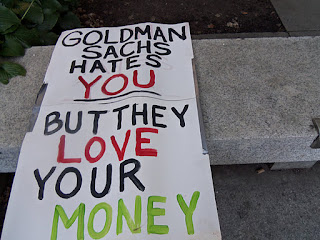I have been arguing for privatization of financial regulation for some time. This bankruptcy proves that we need to find a new paradigm for regulation. The regulations and regulators that we have now in place are not working. After the last financial crisis, it seems incredible that there were no rules in place to limit the leverage and concentration of trades done with firm's money. Once again, one trader has bankrupted an entire firm by taking outsized risks without any fear of a clawback of his earning.
My new paradigm for securities regulations is to empower outside lawyers, with a vote by the commissioners, with the ability to investigate securities and commodities firm, prosecute violators and pocket the fines imposed. I am working on this with the community reporting news site, Spot. us. More details here.
MF Global clients may lose as much as 40% of the capital in their personal accounts. Some of these losses could have prevented if regulators were paying attention, Many institutional investors, having their ear to the ground, rushed to withdraw their money last week. A money manager in Chicago told the New York Times that his firm, hearing the rumors, pulled out $5 million last week. The CTFC gave sophisticated investors an advantage by not blocking last week's hastily arranged withdrawals. Maybe, the withdrawals can be clawed back like they are in a Ponzi scheme.
Corzine, who should have known better, was using the commodities firm, which was also a registered broker-dealer, as his own private casino. He was making huge bets, leveraged 40 to 1, on European sovereign debt with the firm's money. If he won, he would become richer. If he lost, he would walk away as he has done.
The Financial Industry Regulatory Authority, a private organization, first raised the alarm about MF Global's risky bet. Then the panic spread. MF Global tried to sell itself to Interactive Brokers but the missing client money precluded a deal. The firm may not have been properly segregating customer money.; It may have been using the money to shore up their under the water positions.
We might be able to write this off this speculative use of firm money as a one time incident except that Corzine and the CEOs of other commodity firms were lobbying the CTFC to even further relax the rules surrounding commodity firms' uses of customers' money. Gensler wanted to tighten the rules, but apparently was unable to stand up to the bulldozer that is Corzine. The Republican commissioners were also against more regulation. Gensler isn't perfect. When he served in the Clinton White House, he was against additional regulation of derivatives.
The coziness of Gensler and Corzine may be unseemly but probably had very little effect on the final result. When I was at Wharton, Gensler and his twin brother were the most intelligent and best prepared students in every class I attended. If Gensler was blindsided by Corzine's actions, then probably no one could have seen it. When traders leave Wall Street and become Washington regulators, something appears to happen to them. It must be the brand of cool aid they serve in Washington.
While many treat Elizabeth Warren as a hero for dreaming up the Consumer Financial Protection Bureau, this bureau also would not have prevented the MF Global disaster. More regulations and regulators are not the answer. Smart people in the private sector must be given tools by which they can protect the consumer. Regulators are not up to the job.
There may be one good thing to come out of the MF Global bankruptcy. While it is a commodity firm and not a bank, the bankruptcy should shore up support for the Volcker Rule, which is meant to curtail speculative investments by the banks.





































